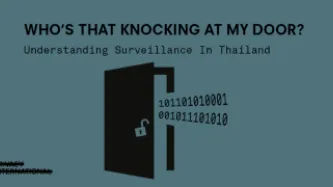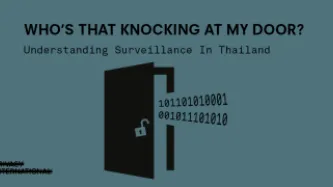Search
Content type: News & Analysis
Written by the Foundation for Media Alternatives
7:01: Naomi wakes up and gets ready for the day.
7:58: Naomi books an Uber ride to Bonifacio Global City (BGC), where she has a meeting. She pays with her credit card. While Naomi is waiting for her Uber, she googles restaurant options for her dinner meeting in Ortigas.
9:00: While her Uber ride is stuck in traffic on EDSA (a limited access highway circling Manilla), Naomi’s phone automatically connects to the free WiFi offered by the…
Content type: Legal Case Files
Investigatory Powers Tribunal
Case No. IPT/13/92/CH
Status: On Appeal
In July 2013, Privacy International filed a complaint before the Investigatory Powers Tribunal (IPT), challenging two aspects of the United Kingdom's surveillance regime revealed by the Snowden disclosures: (1) UK bulk interception of internet traffic transiting undersea fibre optic cables landing in the UK and (2) UK access to the information gathered by the US through its various bulk surveillance programs. Our complaint…
Content type: News & Analysis
Simply put, the National Security Agency is an intelligence agency. Its purpose is to monitor the world's communications, which it traditionally collected by using spy satellites, taps on cables, and placing listening stations around the world.
In 2008, by making changes to U.S. law, the U.S. Congress enabled the NSA to make U.S. industry complicit in its mission. No longer would the NSA have to rely only on international gathering points. It can now go to domestic companies who hold massive…
Content type: News & Analysis
7 October 2013
The following is an English version of an article in the September issue of Cuestión de Derechos, written by Privacy International's Head of International Advocacy, Carly Nyst.
To read the whole article (in Spanish), please go here.
The Chinese government installs software that monitors and censors certain anti-government websites. Journalists and human rights defenders from Bahrain to Morocco have their phones tapped and their emails read by security services. Facebook…
Content type: News & Analysis
This post was written by Chair Emeritus of PI’s Board of Trustees, Anna Fielder.
The UK Data Protection Bill is currently making its way through the genteel debates of the House of Lords. We at Privacy International welcome its stated intent to provide a holistic regime for the protection of personal information and to set the “gold standard on data protection”. To make that promise a reality, one of the commitments in this government’s ‘statement of intent’ was to enhance…
Content type: Long Read
The battle for Kenyan voters’ allegiance in the 2017 Presidential election was fought on social media and the blogosphere. Paid advertisements for two mysterious, anonymous sites in particular started to dominate Google searches for dozens of election-related terms in the months leading up to the vote. All linked back to either “The Real Raila”, a virulent attack campaign against presidential hopeful Raila Odinga, or Uhuru for Us, a site showcasing President Uhuru Kenyatta’s accomplishments. As…
Content type: Press release
A new investigation published today by Privacy International reveals the role of an American data-based digital advertising company in the highly divisive online re-election campaign of Kenyan president Uhuru Kenyatta.
In the run-up to Kenya's presidential election in August 2017, paid advertisements for two mysterious sites dominated Google searches for election-related terms and flooded Kenyans' social media feeds. All linked back to either 'The Real Raila', a virulent attack campaign…
Content type: Examples
In 2016, researchers discovered that the personalisation built into online advertising platforms such as Facebook is making it easy to invisibly bypass anti-discrimination laws regarding housing and employment. Under the US Fair Housing Act, it would be illegal for ads to explicitly state a preference based on race, colour, religion, gender, disability, or familial status. Despite this, some policies - such as giving preference to people who already this - work to ensure that white…
Content type: Examples
A 2017 research report found that the most vulnerable smartphone users are the ones whose devices are most open to fraud and harassment. Cheaper, low-end devices are less secure to begin with, and they are also less often replaced than their more expensive counterparts made by. Apple and Google. At any given time there are millions of Android devices that are open to known exploits. Worse, the poorer population that owns these phones are more likely to use them as their sole means of accessing…
Content type: News & Analysis
17 June 2013
Below is an excerpt of an article that recently appeared in Melbourne, Australia's The Age, written by Carly Nyst, Head of International Advocacy at Privacy International:
"Mass surveillance of a country's citizens by its government can no longer be said to be the preserve of authoritarian and dictatorial states.
The publication last week by The Guardian of classified National Security Agency documents has exposed the extent of surveillance by the US government, throwing…
Content type: News & Analysis
30 May 2017
These days it seems that no election can go by without fears of foul play, whether it is the hacking of a candidate or party’s e-mail or the spread of fake news and other misinformation to support or discredit a particular party or politician.
Often the finger is pointed at shady individuals or rogue governments , and invariably the accusations are met with flat denial. But the accusations have attracted significant attention from governments and companies alike, with reactions…
Content type: Case Study
As society heads toward an ever more connected world, the ability for individuals to protect and manage the invisible data that companies and third parties hold about them, becomes increasingly difficult. This is further complicated by events like data breaches, hacks, and covert information gathering techniques, which are hard, if not impossible, to consent to. One area where this most pressing is in transportation, and by extension the so-called ‘connected car’.
When discussing connected…
Content type: Press release
Privacy International has filed a federal lawsuit seeking to compel disclosure of records relating to a 1946 surveillance agreement between the US, UK, Australia, Canada and New Zealand, known as the “Five Eyes alliance”.* We are represented by Yale Law School’s Media Freedom and Information Access Clinic (MFIA). The most recent publicly available version of the Five Eyes surveillance agreement dates from 1955. Our complaint was filed before the U.S. District Court for the District of Columbia…
Content type: News & Analysis
Ask people around you if they live in a smart city, and more likely than not they will answer that they don’t. I can tell you that because I have tried.
When giving talks about this very topic in cities like Berlin, The Hague and Stockholm, I always ask this question at the start. The rough ratio I tend to get is that: 15 per cent hesitantly raise their hand to say they do, 60 per cent don’t, 20 per cent just look confused and 5 per cent are not listening.
And yet most people who live in cities…
Content type: Case Study
As society heads toward an ever more connected world, the ability for individuals to protect and manage the invisible data that companies and third parties hold about them, becomes increasingly difficult. This is further complicated by events like data breaches, hacks, and covert information gathering techniques, which are hard, if not impossible, to consent to. One area where this most pressing is in transportation, and by extension the so-called ‘connected car’.
When discussing connected…
Content type: Case Study
Political campaigns around the world have turned into sophisticated data operations. In the US, Evangelical Christians candidates reach out to unregistered Christians and use a scoring system to predict how seriously millions these of voters take their faith. As early as 2008, the Obama campaign conducted a data operation which assigned every voter in the US a pair of scores that predicted how likely they would cast a ballot, and whether or not they supported him. The campaign was so confident…
Content type: Case Study
Financial services are collecting and exploiting increasing amounts of data about our behaviour, interests, networks, and personalities to make financial judgements about us, like our creditworthiness.
Increasingly, financial services such as insurers, lenders, banks, and financial mobile app startups, are collecting and exploiting a broad breadth of data to make decisions about people. This is particularly affecting the poorest and most excluded in societies.
For example, the decisions…
Content type: Case Study
Introduction
Online, and increasingly offline, companies gather data about us that determine what advertisements we see; this, in turn, affects the opportunities in our lives. The ads we see online, whether we are invited for a job interview, or whether we qualify for benefits is decided by opaque systems that rely on highly granular data. More often than not, such exploitation of data facilitates and exacerbates already existing inequalities in societies – without us knowing that it occurs.…
Content type: News & Analysis
Creative Commons Photo Credit: Source
The financial services industry is eager to gather more and more data about our lives. Apart from mining the data they have historically collected such as credit history, they are looking to use our social media profiles to reach into our friendships and social interactions. They are using these data in new and unexpected ways, including personality profiling to determine the risk of lending to you, and thus the price you will pay.
Firstcarquote, a…
Content type: Long Read
Disclaimer: This piece was written in April 2017. Since publishing, further information has come out about Cambridge Analytica and the company's involvement in elections.
Recently, the data mining firm Cambridge Analytica has been the centre of tons of debate around the use of profiling and micro-targeting in political elections. We’ve written this analysis to explain what it all means, and the consequences of becoming predictable to companies and political campaigns.
What does…
Content type: State of Privacy
Introduction
Acknowledgment
The State of Surveillance in Thailand is the result of a collaboration by Privacy International and Thai Netizen Network.
Right to Privacy
The constitution
Thailand experienced a coup d'etat in May 2014. According to Mishari Muqbil and Arthit Suriyawongkul, “their [the junta's] modus operandi seems to be the direct command of ministries and semi-governmental organisations to carry out tasks irrespective of existing legislation.”
Following…
Content type: News & Analysis
Technologists hoped the “Crypto Wars” of the 1990s – which ended with cryptographers gaining the right to legally develop strong encryption that governments could not break – was behind them once and for all. Encryption is a fundamental part of our modern life, heavily relied on by everything from online banking and online shopping services to the security our energy infrastructure.
However, from comments by the French and German governments about creating a European initiative to circumvent…
Content type: News & Analysis
In our latest report “Who’s that knocking at my door? Understanding surveillance in Thailand”, we highlighted various methods of surveillance that the Thai Government employs. Included in these methods was the finding that Microsoft was the only technology company which by default trusts the Thai Government’s root certificate. Root certificates ensure the validity of a website, and protect users from being tricked into visiting a fake, insecure website. Most technology companies including Apple…
Content type: News & Analysis
An investigation released by Privacy International this week reveals the Facebook shut-down Thailand experienced in May 2014, at the height of the military coup, may have had more to do with attempting to surveil online communications, rather than censoring Facebook users. This revelation indicates there could be more to other previous internet shutdowns that have happened during times of political unrest.
In May 2014, following months of protest, the Thai military overthrew the…
Content type: Long Read
In July 2015, representatives of a private company met in a parking lot in Pretoria, South Africa to sell phone tapping technology to an interested private buyer. What they did not know was that this buyer was a police officer. The police had been tipped off that the company was looking to offload the surveillance technology, an IMSI catcher, to anyone who would buy it. It is illegal to operate such surveillance technology as a private citizen in South Africa, and illegal to buy…
Content type: Long Read
This piece was written by Ashley Gorski, who is an attorney at the American Civil Liberties Union, and PI legal officer Scarlet Kim and originally appeared in The Guardian here.
In recent weeks, the Hollywood film about Edward Snowden and the movement to pardon the NSA whistleblower have renewed worldwide attention on the scope and substance of government surveillance programs. In the United States, however, the debate has often been a narrow one, focused on the…
Content type: Long Read
This week, Privacy International, together with nine other international human rights NGOs, filed submissions with the European Court of Human Rights. Our case challenges the UK government’s bulk interception of internet traffic transiting fiber optic cables landing in the UK and its access to information similarly intercepted in bulk by the US government, which were revealed by the Snowden disclosures. To accompany our filing, we have produced two infographics to illustrate the…
Content type: Press release
Key points
Privacy International, Liberty, Amnesty International, and seven other human rights organizations challenge UK mass surveillance and UK access to US mass surveillance at the European Court of Human Rights
This is the first case before the European Court of Human Rights to directly challenge UK and US mass surveillance revealed by the Snowden disclosures
National courts and oversight bodies have failed to rein in mass surveillance practices that impact hundreds of millions of…
Content type: Long Read
This piece originally appeared here.
On both sides of the Atlantic, we are witnessing the dramatic expansion of government hacking powers. In the United States, a proposed amendment to Rule 41 of the Federal Rules of Criminal Procedure would permit the government to obtain a warrant, in certain circumstances, to hack unspecified numbers of electronic devices anywhere in the world. Meanwhile, across the pond, the British Parliament is currently debating the Investigatory…
























